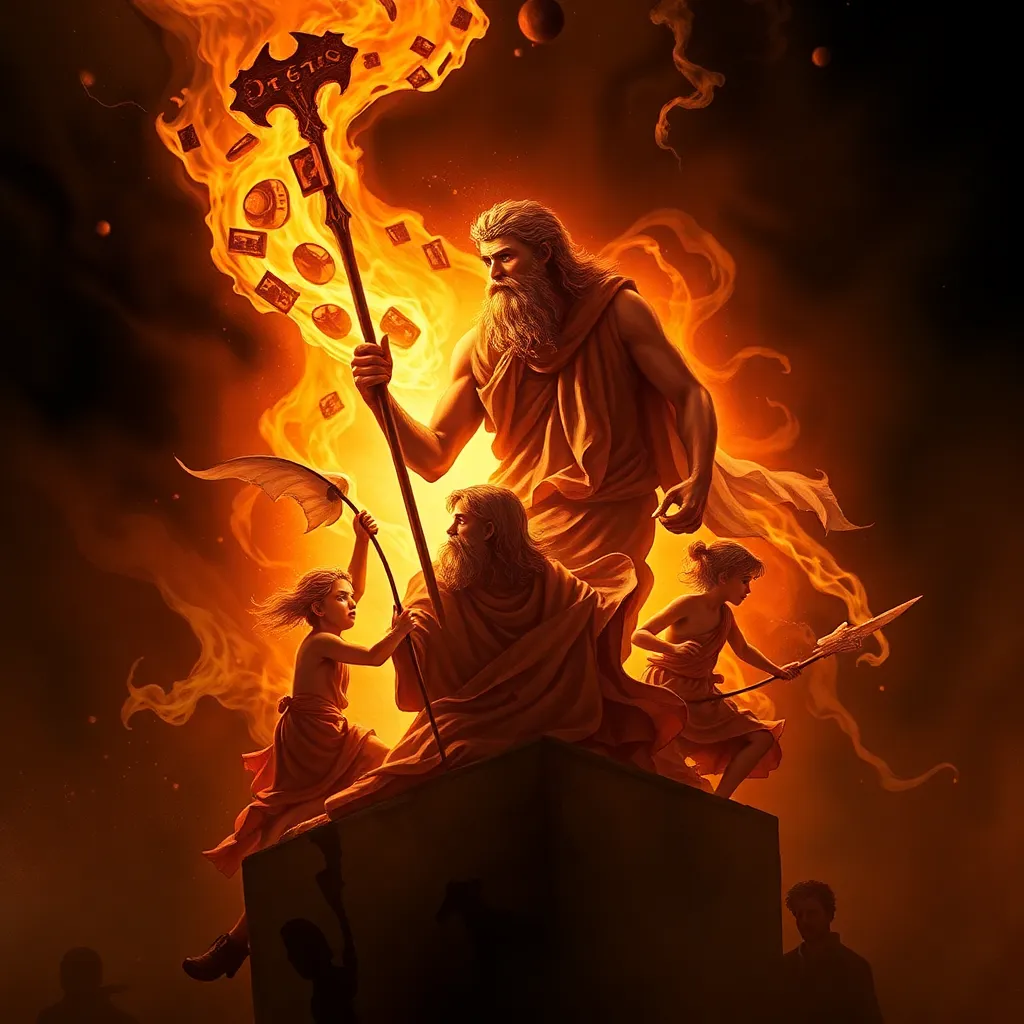The Myths of Hephaestus’ Children: Legacy and Lineage
I. Introduction
In the rich tapestry of Greek mythology, Hephaestus stands out as the god of fire, metalworking, and craftsmanship. Known for his remarkable skills in forging and his inventive genius, Hephaestus holds a vital place among the Olympian deities. His children, though not as widely recognized as other divine figures, play significant roles in various mythological narratives, each embodying unique traits and stories that contribute to the broader mythology of ancient Greece. This article aims to delve into the myths surrounding Hephaestus’ offspring, exploring their legacies, roles, and the impact they have had on both ancient and modern cultures.
II. Hephaestus: The God of Fire and Craftsmanship
Hephaestus, often depicted as a bearded man with a hammer and anvil, is the son of Zeus and Hera. According to myth, he was born with a physical deformity, which led to his rejection by his mother and subsequent banishment from Olympus. Despite this, Hephaestus established himself as a master craftsman, creating magnificent weapons and intricate artifacts for the gods. His workshop, located beneath Mount Etna, was said to be the birthplace of wonders including Zeus’s thunderbolts and Achilles’ armor.
Within the pantheon of Olympian gods, Hephaestus holds a unique position. Unlike many of his divine counterparts who are primarily associated with warfare or love, Hephaestus embodies the spirit of creativity and innovation. His craftsmanship symbolizes not only physical skill but also the transformative power of art and labor.
III. The Mythical Progeny of Hephaestus
Hephaestus is known to have fathered several children, each with distinct attributes and stories. His most notable offspring include:
- Thalia: The Muse of Comedy
- Eucleia: The goddess of good repute
- Other children: Various lesser-known figures associated with craftsmanship and creativity
His most famous consort is Aphrodite, the goddess of love and beauty, who gave birth to Thalia and possibly Eucleia. However, myths also suggest other unions that may have led to the birth of additional progeny.
IV. The Myths Surrounding Each Child
Each of Hephaestus’ children carries their own narrative, contributing to the richness of Greek mythology.
A. Thalia: The Muse of Comedy and her Artistic Legacy
Thalia, one of the nine Muses, represents the light-hearted aspects of art and performance, particularly comedy and idyllic poetry. She is often depicted with a comic mask and a shepherd’s staff, symbolizing her connection to the joyous and whimsical elements of creativity. Thalia’s influence extends beyond ancient Greece, inspiring countless works of literature and theater throughout history.
B. Eucleia: The Goddess of Good Repute and her Symbolic Meaning
Eucleia embodies the concept of good reputation, honor, and integrity. Her presence in mythology emphasizes the importance of social standing and moral character in ancient Greek society. Eucleia is often invoked in contexts relating to personal honor and public perception, highlighting the values that were essential to the Greeks.
C. Additional Children: Their Roles and Contributions to Mythology
While Thalia and Eucleia are the most well-known, there are other figures attributed to Hephaestus. These include:
- Persephone: In some myths, the goddess of spring is linked to Hephaestus through various narratives.
- Other lesser-known figures: Various other offspring are sometimes mentioned, though their stories are often overshadowed by those of more prominent gods.
V. Misconceptions and Misinterpretations
Despite the fascinating tales of Hephaestus’ children, many misconceptions surround them. Common myths include:
- Thalia and Eucleia as purely comedic or trivial figures, neglecting their deeper symbolic meanings.
- Attributing all artistic and creative inventions solely to their father, overlooking their contributions.
Over time, these myths have evolved, influenced by literature, art, and modern interpretations. Such evolution often leads to a diluted understanding of their significance, reducing complex characters to mere archetypes.
VI. The Legacy of Hephaestus’ Children in Modern Culture
The impact of Hephaestus’ children resonates in contemporary culture. They appear in:
- Literature: Modern novels and plays frequently reference the Muses, including Thalia.
- Film: Adaptations of Greek myths often bring these characters to life, reshaping their stories for new audiences.
- Art: Artists continue to draw inspiration from these figures, illustrating their timeless relevance.
Moreover, the themes of craftsmanship and creativity associated with Hephaestus and his offspring influence modern discussions about art, identity, and societal values.
VII. Comparative Analysis with Other Mythological Lineages
When comparing Hephaestus’ children to those of other gods, such as Zeus and Poseidon, several similarities and differences emerge:
- Similarities: Like Zeus’s children, Hephaestus’ offspring often embody key aspects of their father’s nature.
- Differences: Hephaestus’ children tend to have more artistic and moral roles compared to the often chaotic and powerful children of Zeus.
The role of lineage in shaping myths is crucial, as divine parentage often determines the characteristics and narratives of mythological figures. The significance of Hephaestus’ children lies not only in their divine heritage but also in the values and lessons their stories impart to society.
VIII. Conclusion
In conclusion, the myths surrounding Hephaestus and his children reveal a rich narrative full of creativity, morality, and societal values. The legacy of Hephaestus, alongside the artistic and ethical contributions of his offspring, underscores the multifaceted nature of Greek mythology. Understanding these narratives in their historical context enhances our appreciation for the ancient world and its influence on contemporary culture. The stories of Hephaestus’ children remind us that creativity and integrity are timeless virtues, essential to both individual identity and collective heritage.




